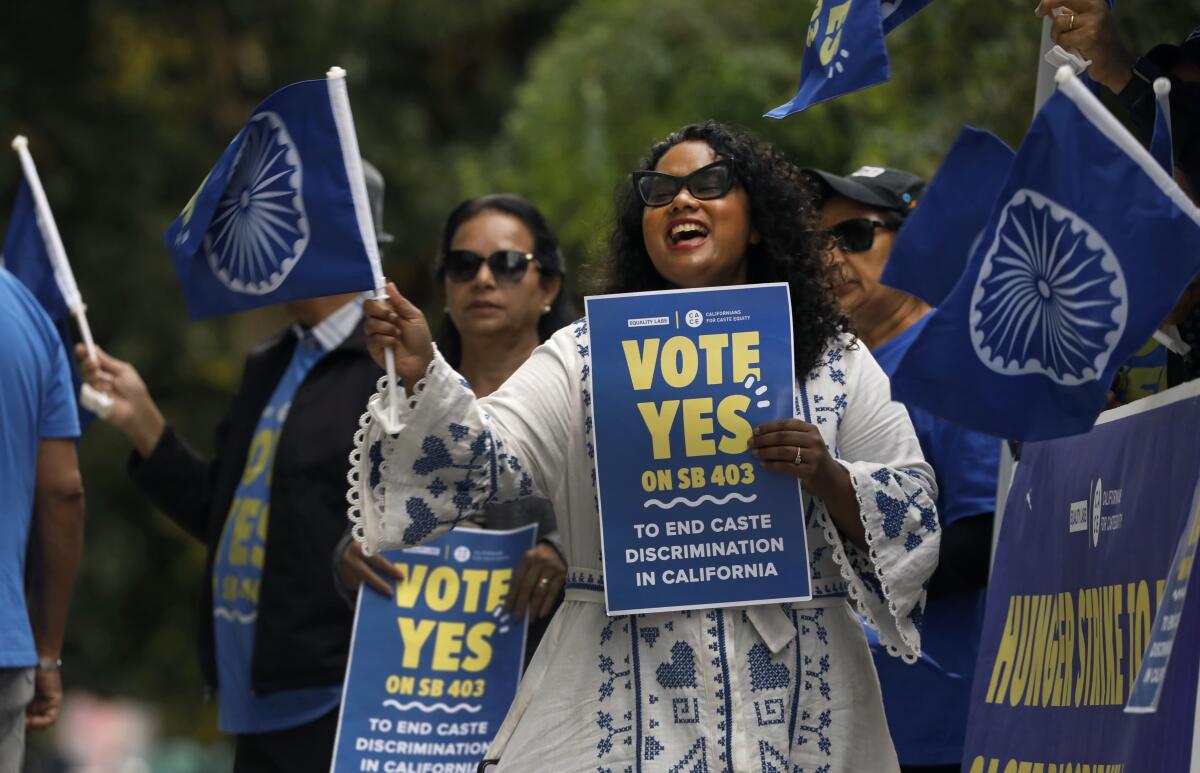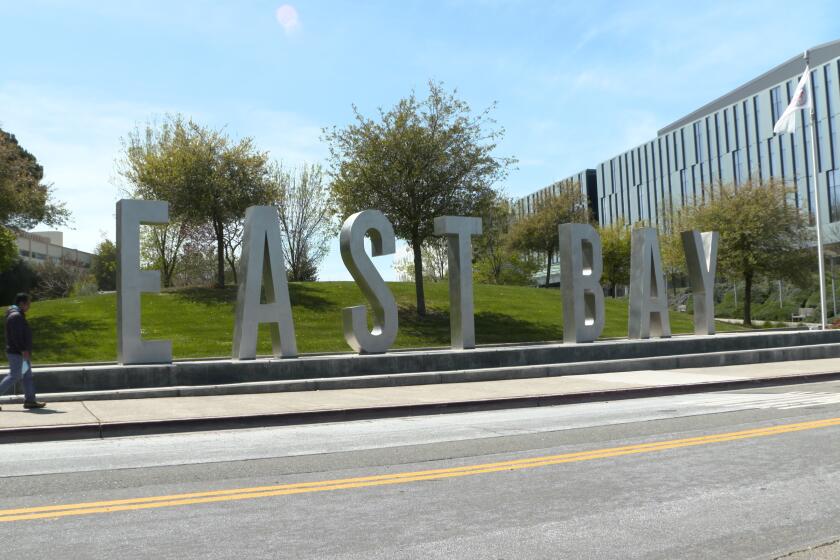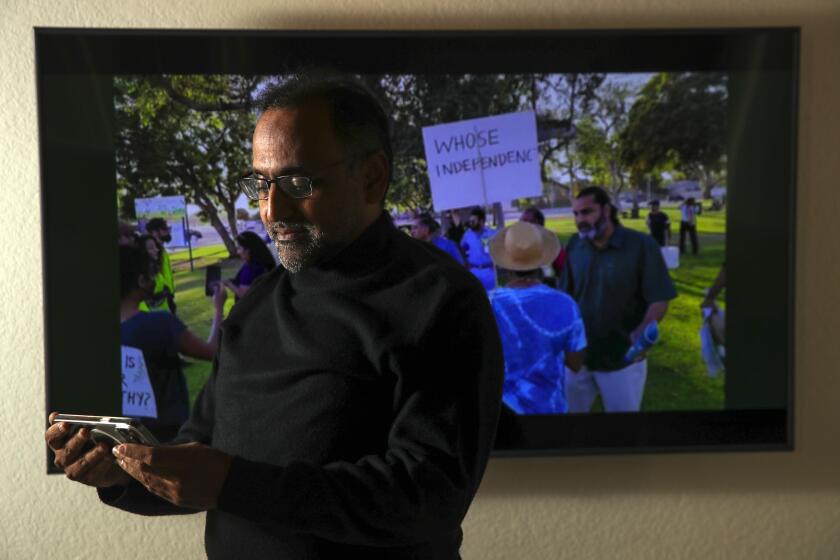Gov. Newsom vetoes bill banning caste discrimination in the workplace, housing and beyond

- Share via
California Gov. Gavin Newsom on Saturday vetoed a bill highly watched by the South Asian community that would have banned discrimination on the basis of caste — a system of social hierarchy that dictates a person’s standing from the time they’re born.
Newsom called the bill “unnecessary” in his veto message, saying existing laws already prohibit such discrimination.
If passed, Senate Bill 403 would have made California the first state in the nation to explicitly acknowledge caste in its civil rights code.
Seattle and Fresno have passed such bans in recent months, reflecting growing awareness among officials as South Asian tech workers and university students in California have become more vocal about the biases they’ve faced. Advocates for the bill included Dalits, caste-oppressed people of South Asian descent, as well as members of the Oaxacan and Indigenous communities who say they have been discriminated against by a similar system. The Ravidassia community, which follows a 14th century Indian guru who preached caste equality and has Dalit roots, also spoke out for the bill.
People with roots in Mexico’s Oaxaca state joined Sikhs’ push for the ban after city and labor leaders in L.A. were caught on tape having a racist conversation.
Some Hindu Americans — a number of which have ties to right-wing Hindu nationalist groups in India — had pushed back against the bill, saying it singled them out as potential perpetrators of discrimination. California Republican Sens. Brian Jones of Santee and Shannon Grove of Bakersfield sent a letter this week to Newsom urging him to veto the bill, saying it would “jeopardize our state’s innovative edge.”
“We hope to move forward without hatred or malice to bring together our community which SB-403 so unnecessarily divided,” Hindu American Foundation Executive Director Suhag Shukla said in a statement after Newsom’s veto.
Advocates for the bill had been on a hunger strike in front of the Capitol Annex building for more than a month, holding rallies where hundreds gathered in support.
“Civil rights is not divisive,” said hunger striker Thenmozhi Soundararajan, executive director of the national Dalit civil rights organization Equality Labs and a member of the California Coalition for Caste Equity, before Newsom’s veto. “Discrimination is divisive.”
Soundararajan, who is Dalit, said caste-oppressed people have been mobilizing for years to fight violence and discrimination against their communities, and their organizing won’t end with the governor’s veto.
“While it is heartbreaking to receive the Governor’s veto, it is not a reflection of the incredible democratic power that our communities showed,” Soundararajan said in a written statement. “We did the impossible. This is the first state bill caste-oppressed people organized and built amazing power and awareness on this issue.”
Even though India banned discrimination based on caste decades ago, bias based on the system lingers today, even among the diaspora, advocates have said.
In a major lawsuit, California regulators sued Cisco Systems in 2020, saying two dominant-caste managers discriminated against a Dalit engineer. The officials have since dropped their case against the managers, but the suit against the company is ongoing.
The California State University system in 2022 added caste to its anti-discrimination policy after hearing from those in the Dalit community, including Prem Pariyar, then a student at Cal State East Bay in Hayward. He had spoken about segregated housing, exploitation by dominant-caste co-workers at his restaurant job and about how a classmate from India blocked his efforts to organize a campus conference on Dalit rights.
“It’s people from my district who are suffering,” state Sen. Aisha Wahab (D-Hayward), who wrote the bill, said in an interview in February when she announced the legislation.
Prem Pariyar fled Nepal only to encounter caste discrimination in the U.S. A survey shows Dalits have faced assaults and discrimination at universities, tech firms and more.
Ancestry has been included in the list of characteristics — such as race, gender, disability, age and religion — protected from harassment or discrimination in employment and housing, from businesses and in public education. SB 403 would have included caste in the state laws’ definition of ancestry. Some have argued such bill is necessary to explicitly clarify that the state bans caste discrimination.
Some Hindu groups in California had aggressively pushed back against the bill, calling it “Hinduphobic” and saying people associate caste with Hinduism.
“The right to practice my religion of fundamental constitutional rights is mine,” said Geeta Sikand, an associate clinical professor of medicine at UC Irvine. She is also director of communications for Americans4Hindus, a political action committee that supports what it says are “Pro-Hindu candidates.”
“Calling me a caste oppressor is outrageous and vicious,” Sikand said.
Those groups had packed City Council meetings in the Bay Area and the Legislature’s committee hearings in Sacramento urging lawmakers to oppose the bill.
But the bill’s backers and South Asia experts had said that public discourse about the bill was flooded with misinformation. Wahab and Dalit rights activists who backed the bill said they faced harassment and threats of rape and death for their anti-caste advocacy.
Indian Independence Day means vastly different things across a country shaped by religious and ethnic conflicts, as well as caste discrimination.
Dheepa Sundaram, an assistant professor of religious studies at the University of Denver, said groups such as Hindu Swayamsevak Sangh and the Vishwa Hindu Parishad of America with ties to India have been very active in opposing the bill. Right-wing Hindu nationalist groups in India have been bolstered under Prime Minister Narendra Modi.
Those groups were able to mobilize the community through social media posts and op-eds with their argument that Hindu Americans were being attacked, Sundaram said.
More to Read
Sign up for Essential California
The most important California stories and recommendations in your inbox every morning.
You may occasionally receive promotional content from the Los Angeles Times.















